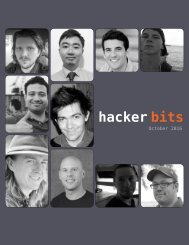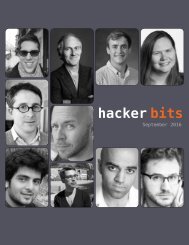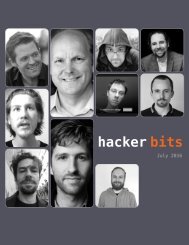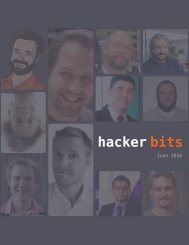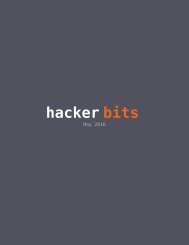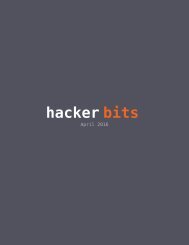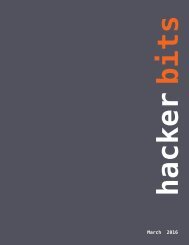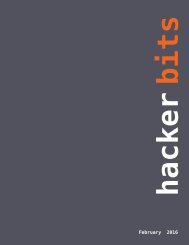Hacker Bits, August 2016
HACKER BITS is the monthly magazine that gives you the hottest technology stories crowdsourced by the readers of Hacker News. We select from the top voted stories and publish them in an easy-to-read magazine format. Get HACKER BITS delivered to your inbox every month! For more, visit https://hackerbits.com/2016-08.
HACKER BITS is the monthly magazine that gives you the hottest technology stories crowdsourced by the readers of Hacker News. We select from the top voted stories and publish them in an easy-to-read magazine format.
Get HACKER BITS delivered to your inbox every month! For more, visit https://hackerbits.com/2016-08.
Create successful ePaper yourself
Turn your PDF publications into a flip-book with our unique Google optimized e-Paper software.
Makers vs manager’s schedule —<br />
“When you’re operating on the maker’s<br />
schedule, meetings are a disaster.”<br />
level of goods and services<br />
in an economy over a period<br />
of time.” (Related: real vs<br />
nominal value, hyperinflation,<br />
deflation, debasement)<br />
• (3) Gross domestic product<br />
(GDP) — “A monetary measure<br />
of the market value of all<br />
final goods and services produced<br />
in a period (quarterly<br />
or yearly).”<br />
• (3) Efficient-market hypothesis<br />
— “Asset prices fully<br />
reflect all available information…Investors,<br />
including<br />
the likes of Warren Buffett,<br />
and researchers have disputed<br />
the efficient-market<br />
hypothesis both empirically<br />
and theoretically.” (Related:<br />
alpha)<br />
• (3) Purchasing power parity<br />
— “Allows one to estimate<br />
what the exchange rate between<br />
two currencies would<br />
have to be in order for the<br />
exchange to be at par with<br />
the purchasing power of the<br />
two countries’ currencies.”<br />
• (3) Insider trading — “The<br />
trading of a public company’s<br />
stock or other securities<br />
(such as bonds or stock<br />
options) by individuals with<br />
access to nonpublic information<br />
about the company.”<br />
• (3) Poison pill — “A type of<br />
defensive tactic used by<br />
a corporation’s board of<br />
directors against a takeover.<br />
Typically, such a plan gives<br />
shareholders the right to buy<br />
more shares at a discount<br />
if one shareholder buys a<br />
certain percentage or more<br />
of the company’s shares.”<br />
(Related: proxy fight).<br />
Learning<br />
• (1) Deliberate practice<br />
— “How expert one<br />
becomes at a skill has more<br />
to do with how one practices<br />
than with merely performing<br />
a skill a large number of<br />
times.”<br />
• (3) Imposter syndrome<br />
— “High-achieving<br />
individuals marked by an<br />
inability to internalize their<br />
accomplishments and a persistent<br />
fear of being exposed<br />
as a ‘fraud’.”<br />
• (3) Dunning-Kruger effect<br />
— “Relatively unskilled<br />
persons suffer illusory superiority,<br />
mistakenly assessing<br />
their ability to be much<br />
higher than it really is…<br />
[and] highly skilled individuals<br />
may underestimate their<br />
relative competence and<br />
may erroneously assume<br />
that tasks which are easy<br />
for them are also easy for<br />
others.” (Related: overconfidence<br />
effect)<br />
• (3) Spacing effect — “The phenomenon<br />
whereby learning<br />
is greater when studying is<br />
spread out over time, as opposed<br />
to studying the same<br />
amount of time in a single<br />
session.”<br />
Productivity<br />
• (1) Focus on high-leverage<br />
activities — “Leverage should<br />
be the central, guiding<br />
metric that helps you determine<br />
where to focus your<br />
time.” (Related: Eisenhower<br />
decision matrix — “what is<br />
important is seldom urgent,<br />
and what is urgent is seldom<br />
important.”, “The best<br />
time to plant a tree was 20<br />
years ago. The second best<br />
time is now.”, law of triviality<br />
— “members of an organisation<br />
give disproportionate<br />
weight to trivial issues.”)<br />
• (1) Makers vs manager’s<br />
schedule — “When you’re<br />
operating on the maker’s<br />
schedule, meetings are a disaster.”<br />
(Related: deep work)<br />
hacker bits<br />
41








